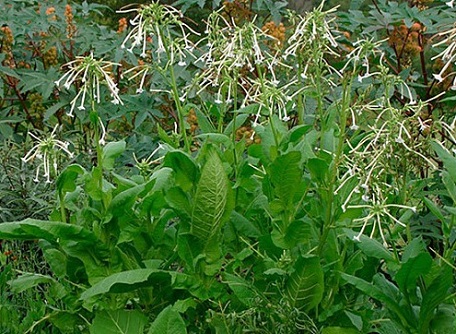For The Latest Medical News, Health News, Research News, COVID-19 News, Pharma News, Glaucoma News, Diabetes News, Herb News, Phytochemical News, Thailand Cannabis News, Cancer News, Doctor News, Thailand Hospital News, Oral Cancer News, Thailand Doctors
Herbs And Phytochemicals: Researchers from Hefei University of Technology and Anhui Provincial Key Laboratory of Aerosol Analysis, China, have identified a new active polysaccharide derived from the Nicotiana plant. This polysaccharide has shown promise in improving memory loss in mice, specifically addressing cognitive damage caused by lead exposure. The results are opening new avenues in brain health by linking gut microbiota modulation with cognitive function. This Herbs And Phytochemicals news report explains the study's key findings and explores the exciting potential for human health applications.

A plant-based polysaccharide from Nicotiana could help reverse memory
loss caused by Lead exposure
A Closer Look at the Study
In a groundbreaking study, scientists led by Dr Ruili Yang, Dr Feng Zhu, Dr Wanying Mo, Dr Dongliang Zhu, Dr Zengyang He, and Dr Xiaojing Ma embarked on investigating the impact of a newly discovered plant polysaccharide from Nicotiana on memory loss. The study used mice as subjects to explore how this plant extract could reverse memory impairment caused by lead exposure.
The experimental setup involved exposing the mice to lead acetate from birth until they reached seven weeks old, creating a model of lead-induced memory loss. After weaning, two doses of the polysaccharide - 200 and 400 ppm - were administered daily. The memory function of the mice was evaluated using the Morris water maze test, a well-known method for assessing spatial memory in animals. The mice that were treated with the 400 ppm dosage showed significant improvement, navigating the maze faster and with fewer errors than untreated mice.
The study also provides insight into how the plant-based compound interacts with both the brain and the gut, shedding light on the mechanism behind this cognitive improvement.
How the Polysaccharide Helps Memory
The research revealed that this plant polysaccharide does not just reverse the effects of lead-induced memory loss by acting directly on the brain. Instead, it modulates the gut microbiota, which has been increasingly recognized as a critical factor in maintaining brain health. The gut - brain axis, a complex communication network between the digestive system and the brain, is crucial for regulating mood, cognitive function, and overall neurological health.
In the lead-exposed mice, the balance of bacteria in the gut was significantly disrupted, contributing to inflammation and poor cognitive performance. When the polysaccharide was introduced, it helped restore a more balanced gut microbiome. Specifically, the gut bacteria associated with inflammation were suppressed, while beneficial bacteria such as Firmicutes and Muribaculum thrived.
The Role of IL-6 and Gut Microbiota
One of the standout discoveries of the study was the role of interleukin-6 (IL-6), a pro-inflammatory cytokine, in the memory recovery process. Lead exposure is known to increase IL-6 levels, contributing to inflammation bot
h in the gut and the brain. This inflammation is thought to play a key role in the cognitive decline seen in the mice. However, when the polysaccharide was administered, it led to a significant reduction in IL-6 levels, indicating an anti-inflammatory effect.
To further test this finding, the researchers administered tocilizumab, an IL-6 receptor antagonist, to another group of mice. The results were striking - blocking IL-6 with tocilizumab led to similar improvements in memory as the polysaccharide. This finding suggests that IL-6 plays a central role in the negative effects of lead on memory and that the polysaccharide's ability to lower IL-6 levels is a crucial part of its cognitive benefits.
Interestingly, the mice treated with both tocilizumab and the plant polysaccharide showed even greater improvement than either treatment alone. This suggests that the combination of reducing inflammation through IL-6 inhibition and restoring gut health through polysaccharide supplementation might be an effective strategy for improving memory.
H3K27me3: Epigenetic Changes and Memory
In addition to modulating the gut microbiota and reducing inflammation, the plant polysaccharide also appeared to influence epigenetic markers in the brain. Specifically, the researchers found changes in the levels of a histone modification called H3K27me3, which plays a role in regulating gene expression related to memory and learning.
The mice exposed to lead had lower levels of H3K27me3 in their brain tissue, which was associated with poorer memory performance. However, after treatment with the polysaccharide, the levels of this marker were restored to normal. This finding adds another layer of complexity to the study, suggesting that the polysaccharide might influence memory not only by reducing inflammation and restoring gut health but also by altering gene expression in the brain.
Conclusion: A New Hope for Memory Loss
The findings from this study are promising and suggest that plant-based polysaccharides like the one found in Nicotiana could play a significant role in addressing memory loss, particularly in cases caused by environmental toxins like lead. By modulating the gut microbiota, reducing inflammation through IL-6, and restoring critical epigenetic markers, this polysaccharide offers a multi-faceted approach to improving cognitive health.
However, it’s essential to note that these findings are based on animal studies, and further research is needed to explore how these results might translate to human health. If future studies confirm these benefits in humans, plant polysaccharides could become a valuable tool in the fight against memory loss and other cognitive disorders.
The study findings were published in the peer-reviewed journal: Foods.
https://www.mdpi.com/2304-8158/13/19/3177
For the latest on Herbs and Phytochemicals, keep on logging on to Thailand Medical News.
Read Also:
https://www.thailandmedical.news/news/natural-compounds-show-promise-as-adjuvants-for-glioblastoma
https://www.thailandmedical.news/news/taiwanese-study-reveals-heart-health-benefits-of-the-phytochemical-momordicine-i-from-bitter-melon